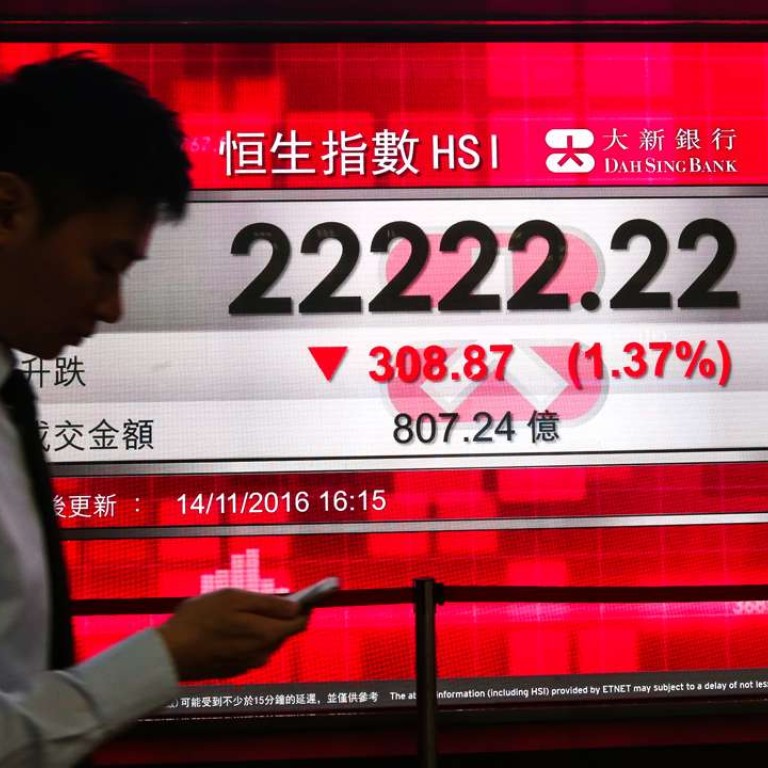
Update | Hong Kong stocks fall to 3-month low on soaring US bond yields
Hang Seng Index closed 1.37 per cent down at 22,222.22 points while the Hang Seng China Enterprises Index dipped 0.96 per cent to 9,342.87
Hong Kong stocks sank to a three-month low on Monday, dragged down by a stronger US dollar and rising Treasury yields after the US presidential election.
The city’s benchmark Hang Seng Index closed 1.37 per cent or 308.87 points down to 22,222.22, while the Hang Seng China Enterprises Index was down 0.96 per cent, or 90.5 points, to 9,342.87.
Hong Kong’s market, sensitive and vulnerable to global markets, has remained weak since last week when the unexpected election victory of Donald Trump roiled investors.
“We are still under selling pressure,” said Alex Wong Kwok-ying, asset management director at Ample Capital. “Donald Trump is the real story behind this.”
Soaring yields on long-dated US debt may squeeze capital outflows from emerging markets. The 30-year US Treasury yields continued to rise, passing a milestone level of 3 per cent on Monday for the first time since January this year.
“We don’t have too much room for a rebound in the [Hang Seng] index,” Wong said.
However, Victor Au, chief operating officer at Delta Asia Securities, said the Hong Kong market may have overreacted to the US election. He added that small companies in the Shenzhen Hong Kong stock connect scheme may draw capital from the mainland.
On Monday, local property developers were among the worst performers in Hong Kong as an increase in stamp duties slowed the introduction of new projects. Transactions dropped to a nine-month low, with just 35 new homes sold over the weekend.
Link Reit lost 2.45 per cent to HK$51.80 and Wharf Holdings tumbled 2.02 per cent to HK$53.35.
Among blue chips, technology giant Tencent saw the biggest drop, falling 3.7 per cent to HK$192.6 ahead of its earnings results due on Wednesday.
We don’t have too much room for a rebound in the [Hang Seng] index
Energy stocks were hit as oil prices continue to be dragged down by oversupply issues, with Opec member countries to decide later this month if they will cut production after record output in October.
The coal sector led gains, moving up 2.04 per cent, while mining stocks lost 1.04 per cent.
China Shenhua fell 1.05 per cent to HK$17.0 and Zhaojin Mining plummeted 7.89 per cent to HK$7.24.
On the mainland, the Shanghai Composite Index increased 0.45 per cent, or 14.33 points, to 3,210.37, its highest level since early this year, while the CSI 300 – which tracks the large caps listed in Shanghai and Shenzhen – was up 0.38 per cent, or 13.03 points, to 3,430.25.
The Shenzhen Component Index rose 0.27 per cent, or 29.39 points, to 10,907.53 and the Shenzhen Composite Index added 0.3 per cent to 2,114.30, while the Nasdaq-style ChiNext increased 0.68 per cent, or 14.58 points, to 2,161.69.
Mainland markets gained after government data showed industrial production climbed 6.1 per cent in October, in line with analyst expectations in Bloomberg surveys. Fixed-asset investments increased 8.3 per cent during the first 10 months of the year, while total retail sales of social consumer goods slowed to 10 per cent.
But Wong discounted the data, saying it reflected the current environment where Barack Obama is still the US president. “After next year, we will see a new world,” he said.
Chinese stocks are officially in a bull market after soaring more than 20 per cent since January on positive economic data and in anticipation of the launch of the Shenzhen-Hong Kong stock connect next week.
While the launch of the new stock connect scheme will allow more mainland capital into Hong Kong’s markets, its effects may be subdued as southbound flows continue to retreat, according to Wong.


